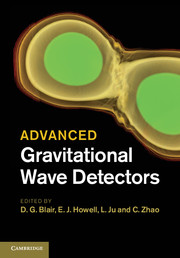Crossref Citations
This Book has been
cited by the following publications. This list is generated based on data provided by Crossref.
Bähre, R
Döbrich, B
Dreyling-Eschweiler, J
Ghazaryan, S
Hodajerdi, R
Horns, D
Januschek, F
Knabbe, E -A
Lindner, A
Notz, D
Ringwald, A
Seggern, J E von
Stromhagen, R
Trines, D
and
Willke, B
2013.
Any light particle search II — Technical Design Report.
Journal of Instrumentation,
Vol. 8,
Issue. 09,
p.
T09001.
Gulian, A
Foreman, J
Nikoghosyan, V
Nussinov, S
Sica, L
and
Tollaksen, J
2014.
"Spaghetti" design for gravitational wave superconducting antenna.
Journal of Physics: Conference Series,
Vol. 507,
Issue. 4,
p.
042013.
Adhikari, Rana X.
2014.
Gravitational radiation detection with laser interferometry.
Reviews of Modern Physics,
Vol. 86,
Issue. 1,
p.
121.
Iqbal, Naseer
and
Monga, Showkat
2014.
Gravitational Waves: Present Status and Future Prospectus.
Natural Science,
Vol. 06,
Issue. 05,
p.
305.
Simakov, D. A.
2014.
Time-domain analysis of a dynamically tuned signal recycled interferometer for the detection of chirp gravitational waves from coalescing compact binaries.
Physical Review D,
Vol. 90,
Issue. 10,
Viceré, Andrea
2014.
Advanced Interferometers and the Search for Gravitational Waves.
Vol. 404,
Issue. ,
p.
21.
Blair, David
Ju, Li
Zhao, ChunNong
Wen, LinQing
Miao, HaiXing
Cai, RongGen
Gao, JiangRui
Lin, XueChun
Liu, Dong
Wu, Ling-An
Zhu, ZongHong
Hammond, Giles
Paik, Ho Jung
Fafone, Viviana
Rocchi, Alessio
Blair, Carl
Ma, YiQiu
Qin, JiaYi
and
Page, Michael
2015.
The next detectors for gravitational wave astronomy.
Science China Physics, Mechanics & Astronomy,
Vol. 58,
Issue. 12,
Gulian, A.
Foreman, J.
Nikoghosyan, V.
Nussinov, S.
Sica, L.
and
Tollaksen, J.
2015.
Superconducting Antenna Concept for Gravitational Waves.
Physics Procedia,
Vol. 67,
Issue. ,
p.
1212.
Kaur, Tejinder
Blair, David
Moschilla, John
and
Zadnik, Marjan
2017.
Teaching Einsteinian physics at schools: part 2, models and analogies for quantum physics.
Physics Education,
Vol. 52,
Issue. 6,
p.
065013.
Riles, Keith
2023.
Searches for continuous-wave gravitational radiation.
Living Reviews in Relativity,
Vol. 26,
Issue. 1,
Smetana, Jiri
Yan, Tianliang
Boyer, Vincent
and
Martynov, Denis
2024.
A High-Finesse Suspended Interferometric Sensor for Macroscopic Quantum Mechanics with Femtometre Sensitivity.
Sensors,
Vol. 24,
Issue. 7,
p.
2375.



